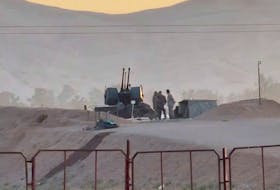By Alexandra Valencia and Yuri Garcia
QUITO/GUAYAQUIL (Reuters) - Ecuadorean authorities have removed 100 corpses from homes in the city of Guayaquil in three days, the interior minister said on Friday, following residents' complaints that they have no way to dispose of relatives' remains amid the coronavirus pandemic.
The coastal city has the country's largest concentration of COVID-19 cases as well as a heavy presence of military officers enforcing curfew prompted by a nationwide health emergency declaration.
Interior Minister Maria Paula Romo said on Friday that the curfew had restricted funeral homes' operating hours and left some family members with no choice but to keep deceased relatives in their homes.
"Some of these deaths are related to the coronavirus and others were not," she said in an interview with online broadcaster MaxTv.
Ecuador as of Friday had reported 1,627 infections and 41 deaths from the novel coronavirus. More than 70% of the cases are in the province of Guayas, where Guayaquil is located.
Romo acknowledged most of those who had died in their homes had not been tested for the virus, and therefore would not appear in the official tally of deaths.
On social media and in interviews with local media, Guayaquil residents have complained of delays of more than 24 hours to remove the remains of relatives, which they said was creating the risk of the disease spreading further.
One such case was that of Bolivar Reyes, 43, a juice merchant, who died after suffering symptoms consistent with COVID-19 but was never tested, his wife Rosa Romero said in a telephone interview.
His remains stayed inside her home in a poor area of northern Guayaquil for more than a day because crews tasked with removing bodies were unable to keep up, she said.
"They told me to be patient, that they hadn't been able to arrive because they only had a single vehicle that needed to go to a number of places," said Romero.
"The neighbors told me that if I didn't get rid of (the remains), they were going to burn down my house."
(Reporting by Alexandra Valencia and Yuri Garcia; Writing by Brian Ellsworth; Editing by Daniel Wallis)








